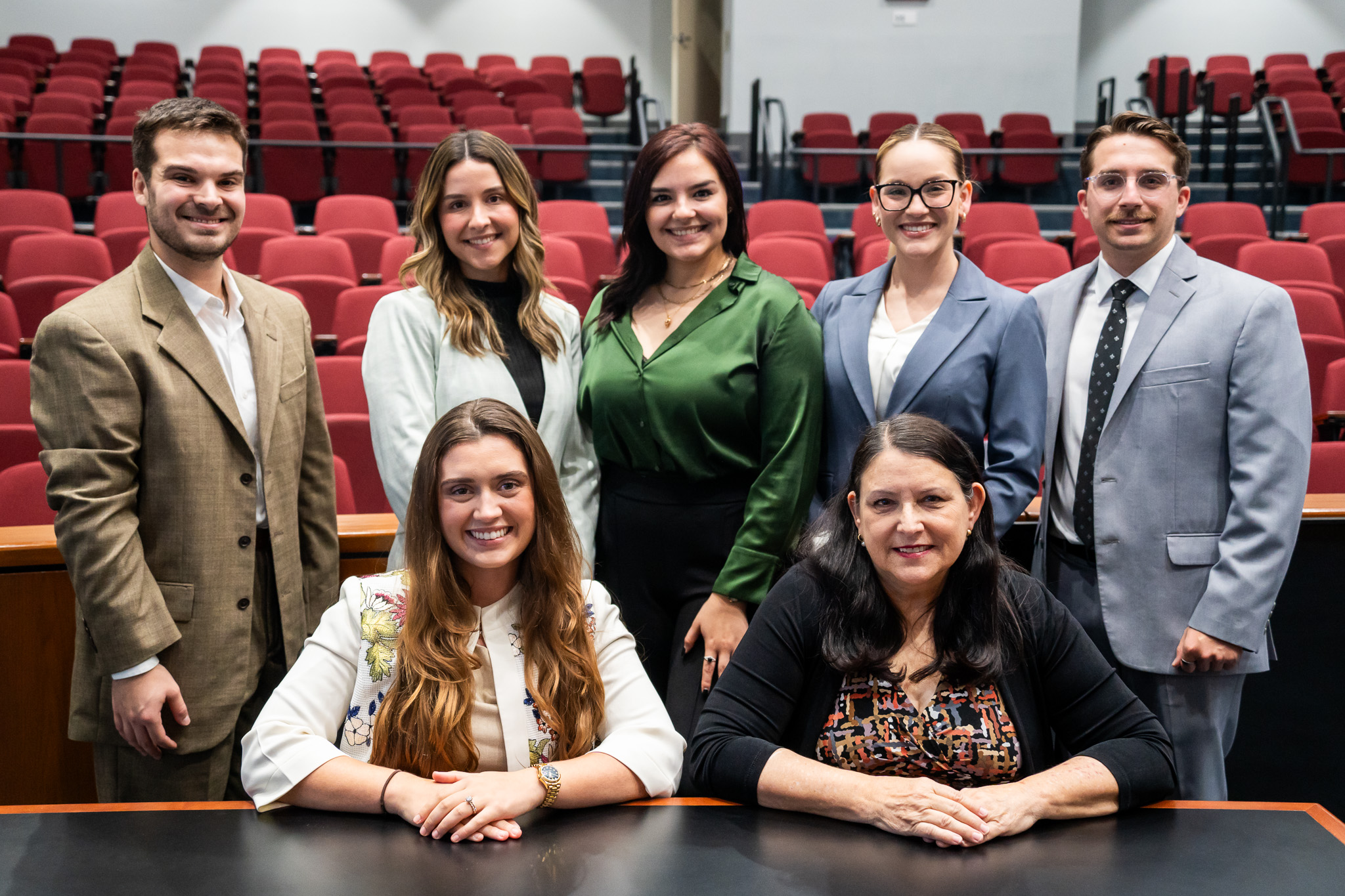
By Walter Villa, Special to STU
Rosanne Sherman had delayed, demurred, and doubted for too long.
After months of thinking about it, Sherman waited for her Wills and Trusts class to end before sprinting up to talk to St. Thomas University law professor Claire Osborn-Wright.
“I nervously asked her if I could be her research assistant,” said Sherman, who was recently married and changed her surname from Nelan. “She said, ‘I’d love to have you, Rosie. You’re a great student.’
“I just melted.”
That conversation – in January of 2023 – was the starting point of what has become something great. Professor Osborn-Wright, with the help of Sherman and five more subsequently hired students from STU’s Benjamin L. Crump College of Law, has written an important paper that is expected to be published in a prestigious law journal this fall.
The title is: Making Criminal Penalties Collar-Blind, which is a reference to the original research done by Professor Osborn-Wright and her team to report on whether defendants who commit blue-collar crimes are given longer sentences than those who commit white-collar crimes.
Minority groups are disproportionately represented among defendants who are convicted of what are considered blue-collar crimes, such as burglary. White-collar crimes include embezzlement, securities fraud, and tax evasion.
Sherman served as the chief research assistant. The five other research assistants who served at various times were Claudia Aravena, Thomas Hodgins, Natalie Nardo, Cole Perez-Blanco, and Maegan Zamora.
The students, who each put in several hours per week on this project, reviewed all criminal cases decided by the U.S. District Court for the Southern District of Florida during the first quarter of 2019.
Professor Osborne-Wright, who graduated from Harvard Law School and practiced as a criminal-defense attorney, details some of the justice system’s inequities in the soon-to-be-published report.
Included in that report are the true stories of George (accused of blue-collar crime) and Angelo Mozilo (accused of white-collar crime).
George, an elderly, homeless alcoholic, stole a $10 bottle of rum from a friend’s liquor store and was going to be sentenced to 20 years in prison under the “three-strikes” policy before Professor Osborn-Wright stepped in to broker a no-jail-time deal.
Meanwhile, Mozilo earned $521.5 million in a four-year period as the CEO of Countryside Mortgage. Countryside was a central player in the mortgage crisis of 2008, which caused the housing bubble to burst and contributed greatly to the Great Recession.
Years later, Mozillo was forced by the Securities and Exchange Commission to pay a fine of $20.5 million, which was only four percent of his salary from 2003 to 2006. But, because he paid that penalty, the U.S. Department of Justice dropped its charges against Mozilo.
Facts like those above have made an impression on STU law-school students.
For example, Hodgins, who is set to graduate from STU in May of 2025, said he has been surprised by some of what the research has revealed.
“Before this project, I wasn’t aware of the sentence disparity,” said Hodgins, who ultimately wants to practice corporate or real-estate law.
“I had just assumed criminal justice was just, and whatever outcome turned up was deserved. But, with this project, I was able to delve deeper and see what went on behind the scenes.
“Not every outcome in court is a just outcome.”
Zamora, set to graduate in May, was also surprised – to a certain extent – by the study.
“I figured there would be a disparity,” she said, “but I didn’t know the magnitude.”
All the students on this project expressed their admiration for Professor Osborn-Wright.
Perez-Blanco, set to graduate in May of 2025, said it was an honor to work with the professor.
“Just to have my name aligned with hers,” said Perez-Blanco, who wants to work in corporate law. “She has always advocated for humanity.”
Sherman, who worked on this project for about eight-plus months before other research assistants were brought on, also has a strong appreciation for Professor Osborn-Wright, taking her classes whenever possible. That includes taking her International Trade class, which was held in Spain this past summer.
“Professor Osborn-Wright gave me my first ‘A’ in law school, which showed me I could do it,” Sherman said. “That ‘A’ meant a lot from her because she graduated at the top of her class at Harvard.
“Working for her has been a law-school dream of mine.”
Professor Osborn-Wright’s mentorship has benefitted Sherman, who has secured a post-graduation job working as a prosecutor for the West Palm Beach state attorney’s office (15th judicial district).
She will take the bar exam in July, and, if all goes well, she will start at her new post on August 12.
Sherman said working on this project will help her immensely at her new job.
“It has helped me understand sentencing guidelines,” Sherman said. “Because I’m now so familiar with the online court-document system, I’m going to walk in a lot more comfortable.”

